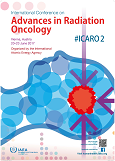Speaker
Belal Moftah
(King Faisal Specialist Hospital and Research Center)
Description
Purpose: To address the challenges that face LMI countries (LMIC) and how radiation oncology service (ROS) professional; medical physicists (MPs) and radiation oncologists (ROs), from 5 different LMIC practically overcame these challenges.
Challenges and solutions: The multiple clinical and administrative challenges in our LMIC are a result of either lack of or insufficiency in the following 4 categories: 1] Number of qualified ROS professionals, 2] Academic education and clinical training, 3] National regulations including official recognition of the ROS professions, 4] Availability of modern equipment and required maintenance. The first two are most important from clinical point of view, whereas the remaining two show the level of maturity and awareness of the ROS professions in the country. To address challenges in categories#1 and #2, several LMIC presented in this study have resorted to collaborative agreements with reputed regional or international cancer institutions. Examples include the agreements between MD Anderson Cancer Center (MDACC) with each Jordan’s King Hussein Cancer Center (KHCC) and Egypt’s National Cancer Institute (NCI); between Zhianawa Cancer Center (ZCC) and West Virginia University and between King Hamad University Hospital (KHUH) and Turkey’s Erciyes hospital. These agreements result in implementation of clinical services and treatment techniques as well as local staff training. Regional collaboration among LMI institutions is also sought after; as an example the collaboration between Jordan’s KHCC with each Egypt’s NCI and Iraq’s ZCC in which MP and RO experts are exchanged. In addition to institutional agreements, networking with regional or international experts is also used to augment certain aspects of clinical service, such as ZCC using King Faisal Specialist Hospital and Research Center (KFSH&RC) MP experts and KFSH&RC using MP experts from McGill University. The second category poses a more difficult challenge. Currently, the Asia part of Arabic countries along with Egypt, a population of approximately 240 million, have few clinical training programs. There is a handful of RO residency programs available one in each country (Egypt, Iraq, Jordan, Lebanon and Saudi Arabia). For MPs, the situation is worse with one residency program in Saudi Arabia. Almost all physicists in our region get on-the-job-training. To mend this severe lack of training, extensive clinical workshops are continuously conducted in the region. The nature of these workshops is hands-on training and each focuses on a particular clinical aspect. Regional countries have adopted a synergistic approach in which each contributes its experts in particular field to train others. These workshops serve as a main source of knowledge transfer and training. To add another layer of challenge, national regulations and recognition of the medical physics (MP) profession is lacking, with the exception of Egypt and Saudi Arabia (SA). In the former the MPs have an official title of “specialist scientist” while in the latter the MPs are fully recognized with preferences for board certification, though itself lacks a board certification scheme/body, even while it hosts the region’s only residency program. It is interesting that neither specialties, MP or RO are available among the list of specialty studies (thirty in total) in the Arab Board of Health Specializations, http://arab-board.org/specialities. Due to lack of national guidelines, large institutions in LMIC are left to develop their own QA protocols adopted from other bodies such as AAPM, IAEA and ESTRO and then pass them on to smaller institutions through training workshops and regional expert visits.
Results: The implementation of the above solutions namely agreements with regional and international institutions and reaching out to individual experts have resulted in many success stories; implementation of SBRT, SRS, VMAT and IMRT techniques in most centers, and improvement in on-going services such as pediatric oncology and brachytherapy in others. The most important impact of these outreach efforts is in regards to training and education of the staff. Graduates of the handful RO residency programs are now practicing in many local LMIC, including Bahrain, Egypt, Palestine (Gaza Strip), Iraq, Jordan, Saudi Arabia and one in the UK. The single MP residency program has graduates working in Jordan, Oman, Saudi Arabia and Yamen.
Conclusion: There is no one-single global solution in establishing safe state-of-art treatment techniques in LMI countries. However, we found that the one successful and cost-worthy solution adopted by professionals in the 5 countries presented in this study is networking and outreach to regional and non-regional institutions and individual experts. LMI states have to adopt a synergistic solution in which each one benefit the other where expertise is lacking. Leading regional institutions should shoulder the burden of passing on the knowledge and provide for training for others. National guidelines and recognition of the ROS professions by the local authorities remain the big challenge that require efforts on the political and global scale.
| Institution | King Faisal Specialist Hospital and Research Center |
|---|---|
| Country | Saudi Arabia |
Author
Shada Wadi-Ramahi
(King Faisal Specialist Hospital and Research Center)
Co-authors
Belal Moftah
(King Faisal Specialist Hospital and Research Center)
Jamal Khader
(King Hussein Cancer Center and Research Center)
Layth Yahya Mula-Hussain
(Zhianawa Cancer Center - Kurdistan Board for Medical Specialties)
Zeinab Alhaddad
(Radiation Oncology Department, King Hamad University Hospital, Manama/Bahrain)
Zeinab Hassan
(Medical Physics Department, National Cancer Institute, Cairo/Egypt)

